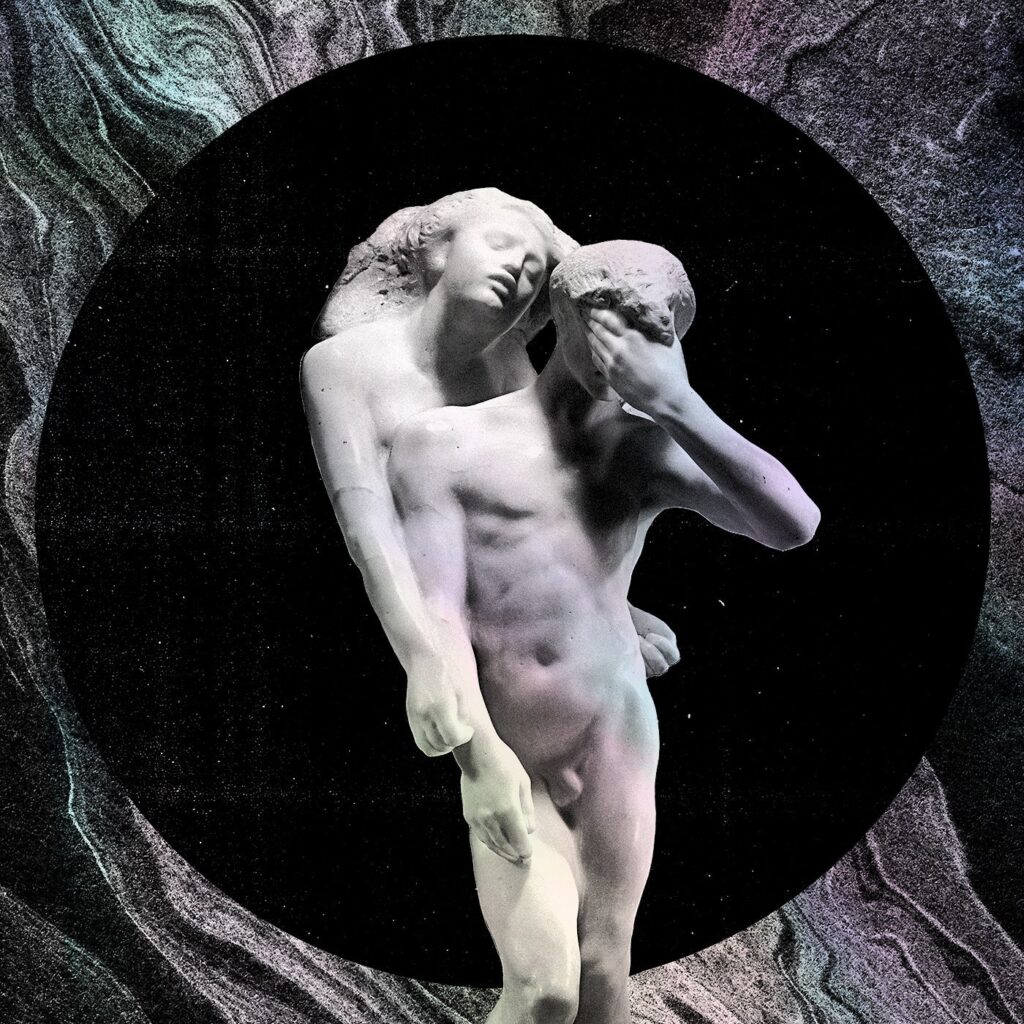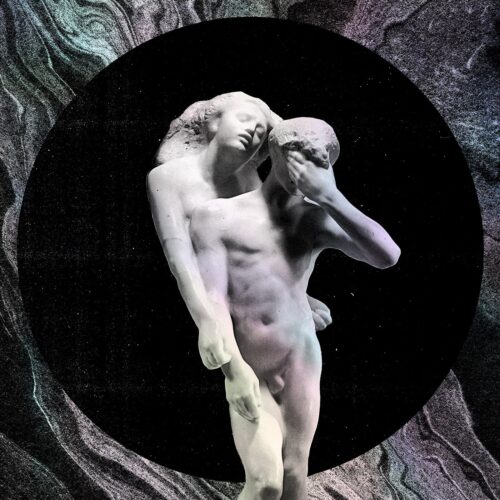What does a band like Arcade Fire see when it looks in the mirror? Hitting the peak of your powers, as they did on the self-consciously important and wildly, widely acclaimed The Suburbs, can be a disorientating, distorting experience.
The sound of Reflektor is that of a band trying to push at the image of what it can be, through the mirror to the other side. A band who, having brought long-running pet themes (the dark underbelly of the suburbs, lost childhood innocence, the breakdown of civilisation in a war-torn dystopian future) to their fullest expression, aren’t sure what else they can do, but are determined to find out. Like Monster coming after Automatic For The People, or Achtung Baby following The Joshua Tree/Rattle and Hum’ it’s a band reaching out from the top of of their game and scratching at the parameters; not polished, not perfect, but tightrope-thrilling.
The surprisingly perfect pairing of co-producer James Murphy (the melancholic-hearted Bowiephile beat hedonist) with this seemingly squarest, least disco of bands, is the magic catalyst. From 80s synth slink to Haitian carnival rhythms to house piano, elements that bear Murphy’s fingerprints never feel tacked on; rather band and producer have skilfully found a grammar in which these different musics can enter a dialogue with Arcade Fire’s frenetic, dark and grandiose art rock. It gels far better than his work on Yeah Yeah Yeah’s Mosquito, which on paper might have seemed a far more natural fit.
I mean, who could you less imagine at a carnival than Win Butler, with his mopey, etiolated Elvis face, his dangling, serious limbs? And yet, in 2011 he visited Port Au Prince with Haitian-Canadian wife Regine Chassagne in a trip which he described as "life-changing" in Rolling Stone. Masked and dancing, he says that he felt "less of a break between the spirit and the body". It’s a state of mind the band have taken to their new album, and not just in the steel drums sounds, the whirls and stomps and dub drops. Their bodies no longer a cage and their "most important band of a generation" tag no longer a millstone, Arcade Fire are, on this record, dancing themselves right out of their skins.
If there’s transformative joy in the music, though, the lyrics often tell a different story. The first of two paired tracks called ‘Here Comes The Night Time’ starts and ends with a dizzying, accelerating whirl of carnival drums and horns, a carousel of frenzied fiesta, before dropping into foghorn-bass, steel-drum laced lovers rock. "When I hear the beat, the spirit’s on me like a live wire/A thousand horses running wild in a city on fire," enthuses Win, but there’s a tense mood to this party, Haiti’s oppressed and bloody past creeping in: "Yeah, heaven’s a place and they know where it is/But you know where it is/It’s behind the gate they won’t let you in/And when they hear the beat coming from the street they lock the door."
The second of the paired tracks has a heavier heart sonically and more personal troubles at its core, a passive, wounded synth hum laced with Bjork-like string sweeps, with Butler picking over the scabs of a low spell: ""I hurt myself again, along with all my friends/Feels like it never ends/Here comes the night time".
Over and over, this albums frets and grasps at relationships slipping out of reach, gently dying. Oftentimes as in the pairing of ‘Awful Sound (Oh, Eurydice)’ and ‘It’s Never Over (Oh, Orpheus)’, that seems like a romantic relationship. Other times, as in the conga-flashing, conspiratorially funky, melancholically housey title track – where the ancient image of art as mirror, sometimes true, sometimes false, comes into play – it seems a falling out of faith with the whole idea of creativity. "Thought you could lead me to the resurrector/Turns out it was just a reflector" mourn Bowie and the band, let down by a false concept.
Elsewhere, it seems to be more specifically a crisis of rock: "Hey… do you like rock and roll music?" drawls Win mockingly as he leads into the disco-Stonesish stomp of ‘Normal Person’, "because I don’t know if I do…". Another thing Win Butler told Rolling Stone about his Haitian carnival epiphany: " It really makes you feel like a hack being in a rock band."
A wobble of intent is to be expected at this stage in Arcade Fire’s career, and not just in their lyrics. You might also expect some embarrassing sonic self-indulgences as they flail for new purpose, but while some have found that in the Clashish dub stylings of the camera-hating ‘Flashbulb Eyes’, but for me, everything here fits them perfectly.
And for all the sense that there’s serious sea changing afoot, there’s still plain fun, as in the exuberant, Smithsish rock & roll jangle of ‘You Already Know’ (featuring a sample of one Jonathan Ross introducing the band on Tonight With… near the start of their career) and the hardcore glam thrash and bounce of ‘Joan Of Arc’. The album rarely drags, and where it does, it’s in the outros, Murphy and the band perhaps getting a little too into jamming their potent new groove, as on the drawn-out ending of the fractious, half-whispered ‘We Exist’, with its not-totally-hypnotic bass-synth and shearing guitar groove, or the unnecessary sound collage on the end of the pretty but perhaps superfluous final track ‘Supersymmetry’ that closes the album with a pretentious whimper.
Still, though a double album of 80 minutes, Reflektor feels shorter than The Suburbs, and better paced; though both discs are strong, the most arresting tracks are the late trio of ‘It’s Never Over (Oh, Orpheus)’, ‘Porno’ and ‘Afterlife’, with their related themes of struggling relationships and last glimmers of hope.
The first captures the moment of looking back at the head of stairs to the underworld in a glimmering, mournful track opening with a synth pulse like an alarm clock lost in the dark and building to a black, Cureish maelstrom. "You say it’s not me, it’s you…" plaints Butler, "Hey Eurydice/Can you see me? I will sing your name/Until you’re sick of me", while Chassagne assures, "And if I shout for you, never doubt/Don’t turn around too soon". The ambiguity of whether the title phrase is a positive or a negative, whether it’s the union or the trouble that’s never over, is bitterly delicious.
‘Porno’, too, is heartbreaking, a breath-held disco prayer that creeps in on fingerclicks and whispers and a steel drum sound twisted into an insistent pulse. as Butler fights to keep caring. "When I reach for you, you say ‘I’m over it…’ They say love is real, like a disease/Come on tell me, please, I’m not over it".
‘Afterlife’ closes the theme, with Butler’s pleas of ‘Can we scream and shout/Just work it out", a Caribbean-tinged, glinting thing with an intro perhaps intentionally reminiscent of New Order’s ‘Temptation’. "But you say," he frets, "When love’s gone, where does it go?" The track ends in intensive-care breaths and bleeps, as Win quavers. "Is this the afterlife?"
The question of what comes next, though, isn’t one that Arcade Fire need fear any longer. With Reflektor, they’ve answered it strongly. Four albums in, their sound glitters with many facets and possibilities – they can be proud of how it reflects on them.



